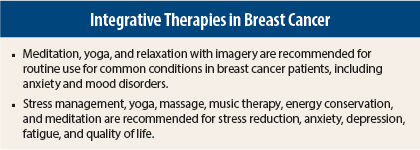The Society for Integrative Oncology (SIO) Guidelines Working Group has recently released clinical practice guidelines on the use of integrative therapies as supportive care in patients receiving treatment for breast cancer. The guidelines, reported by Heather Greenlee, ND, PhD, MPH, of Mailman School of Public Health, Columbia University, and colleagues in the Journal of the National Cancer Institute Monographs,1 were developed by a multidisciplinary panel with expertise in medical oncology, radiation oncology, nursing, psychology, naturopathic medicine, traditional Chinese medicine, acupuncture, epidemiology, biostatistics, and patient advocacy. The guidelines are based on evidence from 203 articles, of 4,900 considered, in the literature published between January 1990 and December 2013.
The guidelines answer an unmet need. As stated by the authors: “The majority of breast cancer patients use complementary and/or integrative therapies during and beyond cancer treatment to manage symptoms, prevent toxicities, and improve quality of life. Practice guidelines are needed to inform clinicians and patients about safe and effective therapies.”
In brief, meditation, yoga, and relaxation with imagery are recommended for routine use for common conditions in breast cancer patients, including anxiety and mood disorders (evidence grade A). Stress management, yoga, massage, music therapy, energy conservation, and meditation are recommended for stress reduction, anxiety, depression, fatigue, and quality of life (grade B).
The guidelines are summarized below, with evidence grade indicated by letters in parentheses. A = Recommended, with high certainty of substantial net benefit. B = Recommended, with high certainty of moderate benefit or moderate certainty of moderate to substantial benefit. C = Selectively recommended based on professional judgment or patient preference, with at least moderate certainty that net benefit is small. D = Recommendation against, with moderate to high certainty of no net benefit. H = Recommendation against, with moderate or high certainty that harm outweighs benefit.
Anxiety/Stress Reduction
- Music therapy is recommended for reducing anxiety during radiation therapy and chemotherapy sessions (B).
- Meditation is recommended for reducing anxiety in all patients and in those undergoing radiation therapy (B).
- Stress management is recommended for reducing anxiety during treatment; longer group programs are likely better than self-administered home programs or shorter programs (B).
- Yoga is recommended for reducing anxiety in patients undergoing radiation therapy or chemotherapy and is suggested for fatigued patients (B).
- Acupuncture can be considered for reducing anxiety in fatigued patients (C).
- Massage can be considered for short-term reduction of anxiety (C).
- Relaxation can be considered for treating anxiety during treatment (C).
Depression/Mood
- Meditation, particularly mindfulness-based stress reduction, is recommended for treating mood disturbance and depressive symptoms in patients undergoing radiation therapy (A).
- Relaxation is recommended for improving mood and depressive symptoms when added to standard care (A).
- Yoga is recommended for improving mood in patients undergoing radiation therapy or chemotherapy and in fatigued patients in addition to standard care (A).
- Massage is recommended for improving mood disturbance in post-treatment patients (B).
- Music therapy is recommended for improving mood in newly diagnosed patients (B).
- Acupuncture can be considered for improving mood in postmenopausal women with hot flashes or fatigue (C).
- Healing touch can be considered for improving mood in patients undergoing chemotherapy (C).
- Stress management interventions with or without exercise can be considered for improving mood (C).
Fatigue
- Energy-conservation counseling is recommended for the treatment of fatigue (B).
- American ginseng can be considered as an herbal approach for treatment of fatigue (C).
- Acupuncture can be considered for treatment of fatigue after completion of cancer treatments (C).
- Modified qigong can be considered for treatment of fatigue (C).
- Acetyl-l-carnitine is not recommended for treatment of fatigue, due to lack of effect (D).
- Guarana is not recommended as herbal treatment of fatigue, due to lack of effect (D).
Sleep
- Stress management techniques (C) and gentle yoga (C) can be considered for treatment of sleep disruption.
Quality of Life and Physical Functioning
- Meditation is recommended for improving quality of life (A).
- Acupuncture (C), guided imagery (C), mistletoe (C), qigong (C), reflexology (C), stress management (C), and yoga (C) can be considered for improving quality of life.
- Exercise/awareness can be considered for improving functioning (C).
- Energy conservation is not recommended for improving functioning, due to lack of effect (D).
Chemotherapy-Induced Nausea/Vomiting
- Acupressure can be considered as an addition to antiemetics to help control nausea and vomiting during chemotherapy (B).
- Electroacupuncture can be considered as an addition to antiemetics to control vomiting during chemotherapy (B).
- Ginger can be considered in patients receiving chemotherapy without concurrent radiation therapy as an addition to antiemetics for the control of acute nausea (C).
- Progressive muscle relaxation can be considered as an addition to antiemetics to help control nausea and vomiting during chemotherapy (C).
- Glutamine is not recommended for treatment of chemotherapy-induced nausea/vomiting, due to lack of effect (D).
Pain
- Energy and sleep enhancement can be considered for pain associated with chemotherapy among unemployed individuals (C).
- Massage and healing touch can be considered for pain associated with chemotherapy (C).
- Music therapy can be considered to relieve pain associated with surgery (C).
- A physical training program that includes a mind-body modality can be considered for relieving pain associated with surgery (C).
- Hypnosis can be considered for relief of pain associated with surgery (C).
- Acupuncture (C) and electroacupuncture (C) can be considered as approaches to short-term treatment of aromatase inhibitor–associated musculoskeletal symptoms.
Neuropathy
- Acetyl-l-carnitine is not recommended for prevention of neuropathy, due to harm (H).
Lymphedema
- Laser therapy can be considered as a treatment for lymphedema (C).
- Manual lymphatic drainage and compression bandaging have been shown to be equivalent. Manual lymphatic drainage can be considered for treatment of lymphedema in patients who have sensitivity to bandaging (C).
Hot Flashes
- Acupuncture (C) and electroacupuncture (C) can be considered for decreasing the number of hot flashes.
- Soy is not recommended for the treatment of hot flashes, due to lack of effect (D).
Acute Radiation Skin Reaction
- Aloe vera (D) and hyaluronic acid cream (D) are not recommended as a standard therapy to prevent or treat acute radiation skin reaction, due to lack of effect.
The authors concluded: “Specific integrative therapies can be recommended as evidence-based supportive care options during breast cancer treatment. Most integrative therapies require further investigation via well-designed controlled trials with meaningful outcomes.” ■
Disclosure: The work was funded by the Society for Integrative Oncology.
Reference
1. Greenlee H, Balneaves LG, Carlson LE, et al, for the Society for Integrative Oncology Guidelines Working Group: Clinical practice guidelines on the use of integrative therapies as supportive care in patients treated for breast cancer. J Natl Cancer Inst Monogr 2014 50:346-358, 2014.



